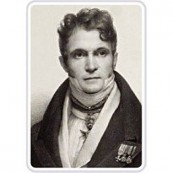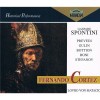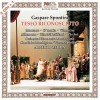| Country: | Italy |
| Period: | Romantique |
Biography
Gaspare Luigi Pacifico Spontini (14 November 1774 – 24 January 1851) was an Italian opera composer and conductor, extremely celebrated in his time, though largely forgotten after his death.
Contents
Born in Maiolati in the province of Ancona, now Maiolati Spontini, he spent most of his career in Paris and Berlin, but returned to his place of birth at the end of his life. During the first two decades of the 19th century, Spontini was an important figure in French opera. In his more than twenty operas, Spontini strove to adapt Gluck's classical tragédie lyrique to the contemporary taste for melodrama, for grander spectacle (in Fernand Cortez for example), for enriched orchestral timbre, and for melodic invention allied to idiomatic expressiveness of words. His single great masterpiece and success was La vestale.[1]
As a youth, Spontini studied at the Conservatorio della Pietà de' Turchini in Naples. In 1803, he went to Paris, where he was appointed court composer in 1805.
Written with the encouragement of Empress Joséphine in 1807, Spontini wrote La vestale, his best known work. Its premiere at the Opéra in Paris established Spontini as one of the greatest Italian composers of his age. His contemporaries Cherubini and Meyerbeer considered it a masterpiece, and later composers such as Berlioz and Wagner admired it.
During the Peninsular War, "Napoleon promoted works such as Gasparo Spontini's Fernand Cortez (1809)," which concerned the Spanish conquest of Mexico under the reign of Charles V.[2] Spontini's later opera Olimpie (1819, revised 1820, 1826) met with indifference, leading him to leave Paris for Prussia, where he became Kapellmeister and chief conductor at the Berlin Hofoper. There he showed hostility toward the young Mendelssohn.













